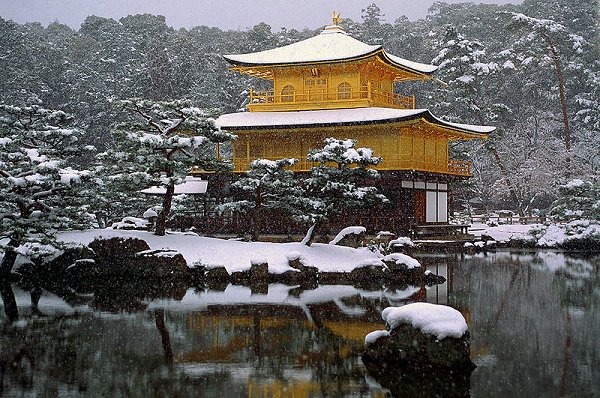Kinkaku-ji (GPS: 35.03937, 135.72924) is arguably the most famous temple in Kyoto, and one of the most iconic images of Japan. It is regarded as an excellent example of Muromachi period garden design. As with the Ginkaku-ji, the name Kinkaku-ji is a nickname, while its actual name is Rokuon-ji.
The centerpiece of this garden is the pavilion, a three-storey structure with its upper two storeys covered with pure gold leaf. At the top of the pavilion is a bronze phoenix. The Kinkaku-ji functions as a place where the relics of the Buddha's ashes are housed. The building became a model for later temple buildings including the Ginkaku-ji and Shokoku-ji.
Kinkaku-ji was built by the third Ashikaga shogun, Yoshimitsu (1358-1408). It stands on the site of a villa belonging to a power statesman, Saionji Kintsune. Yoshimitsu bought the estate in 1397 for his retirement villa. After his death, his son converted it into a Zen temple, according to his wishes.
The Kinkaku-ji was destroyed in a fire started by a demented monk, Hayashi Yoken, who afterwards attempted suicide, but was apprehended and sent to prison. He was eventually released on account of insanity, but he died less than a year after his release, from a combination of other illnesses.
 Kinkaku-ji in winter, Kyoto
Kinkaku-ji in winter, KyotoSource: http://commons.wikimedia.org/wiki/File:Kinkaku-Snow-6.jpg
Author: Fg2

Author: Fg2

Kinkaku-ji is  on the Map of Kyoto
on the Map of Kyoto
 Latest updates on Penang Travel Tips
Latest updates on Penang Travel Tips
 Map of Roads in Penang
Map of Roads in Penang
Looking for information on Penang? Use this Map of Roads in Penang to zoom in on information about Penang, brought to you road by road.
Copyright © 2003-2025 Timothy Tye. All Rights Reserved.

 Go Back
Go Back